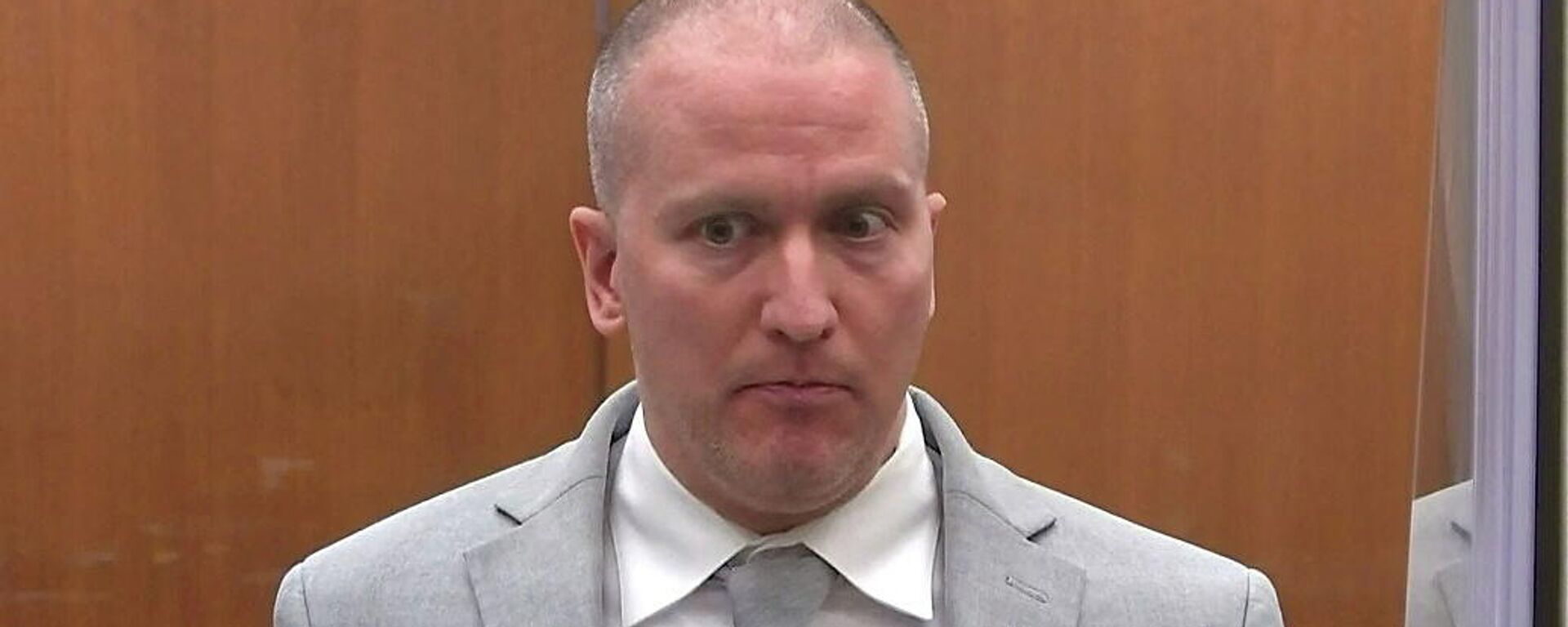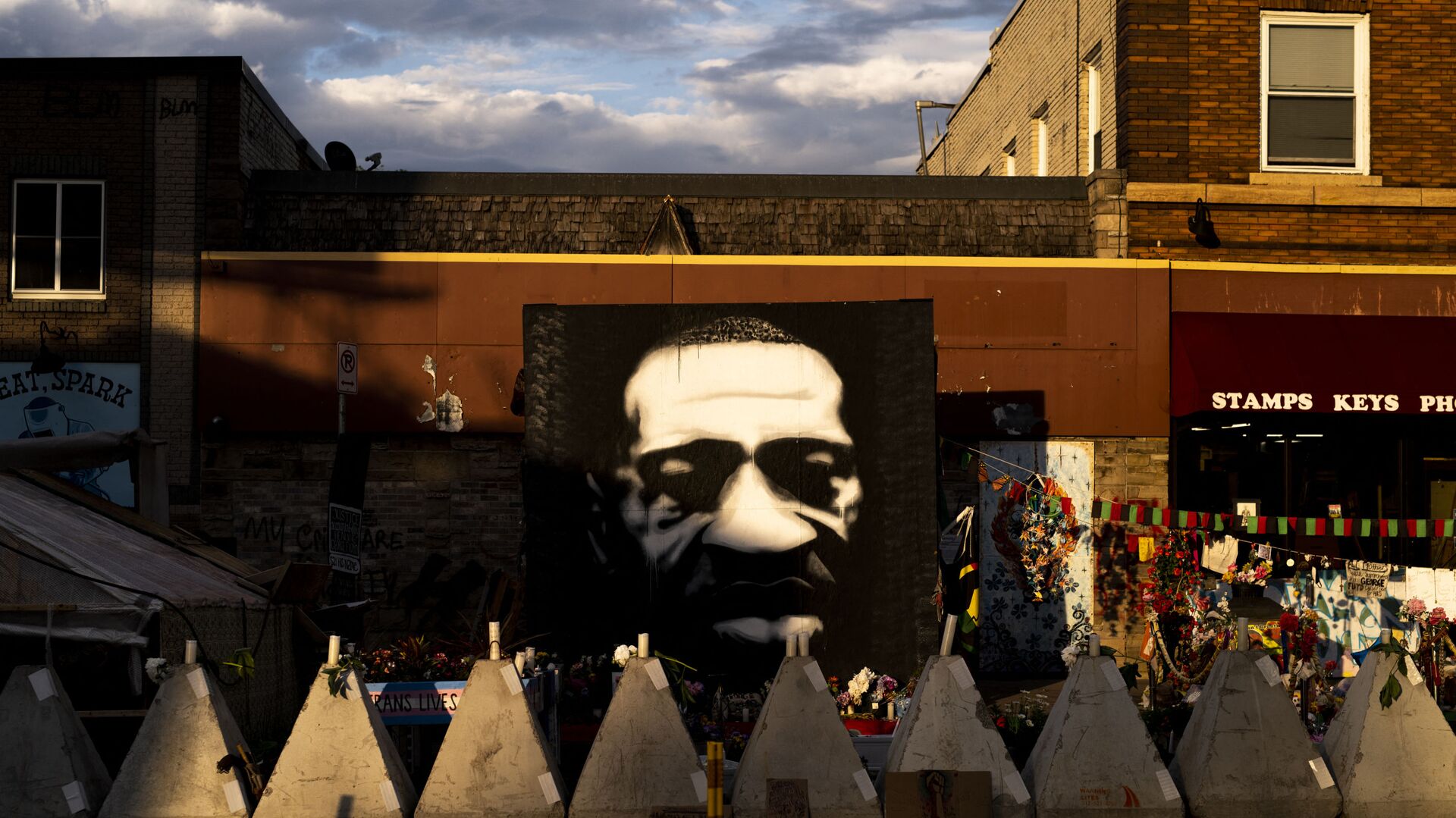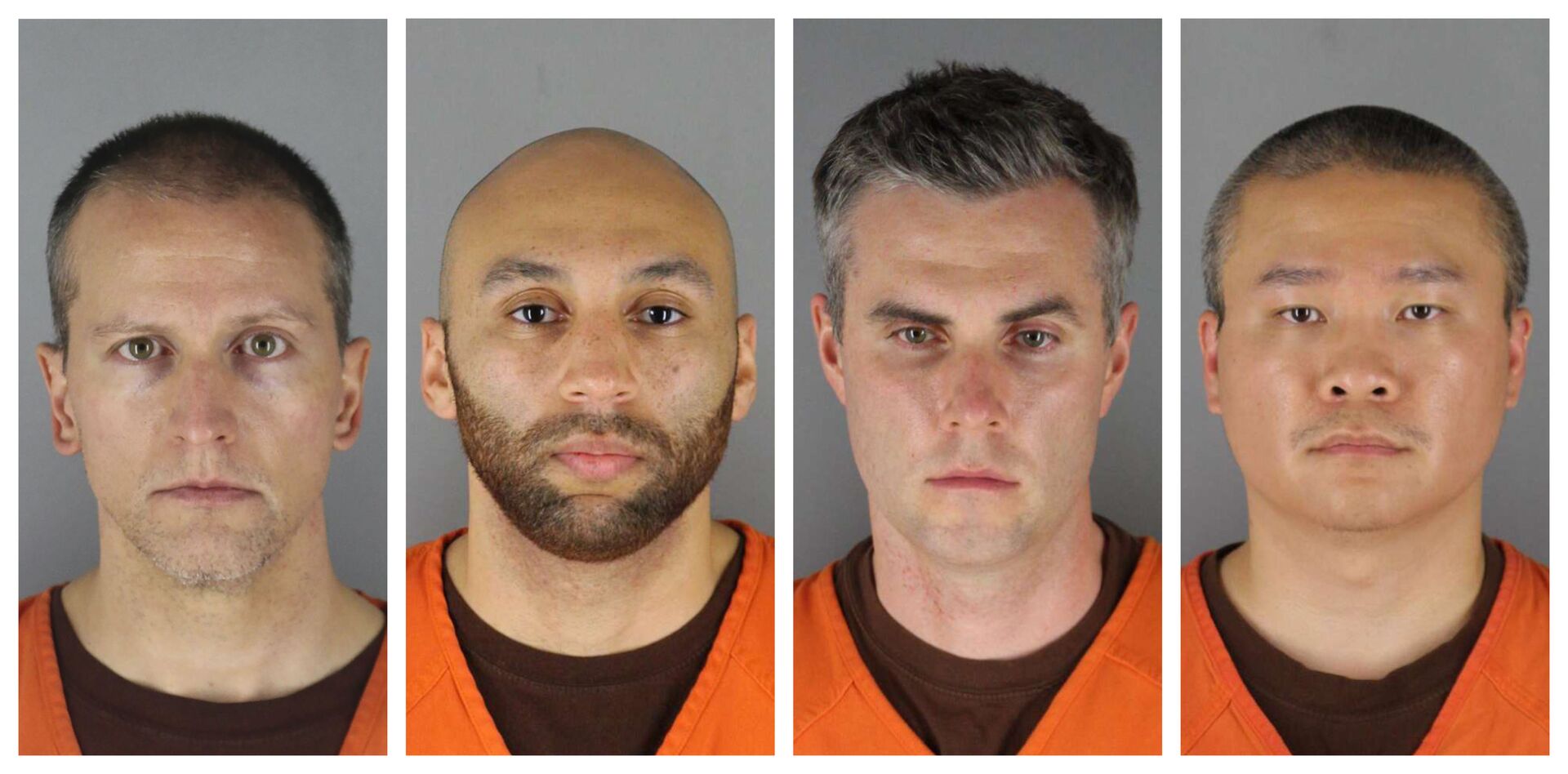https://sputnikglobe.com/20220124/george-floyd-civil-rights-case-us-prosecutors-give-opening-remarks-in-trial-against-former-cops-1092493578.html
George Floyd Civil Rights Case: US Prosecutors Give Opening Remarks in Trial Against Former Cops
George Floyd Civil Rights Case: US Prosecutors Give Opening Remarks in Trial Against Former Cops
Sputnik International
In April of 2021, former police officer Derek Chauvin was found guilty on three counts of murdering George Floyd, a 46-year-old Black man. The three former... 24.01.2022, Sputnik International
2022-01-24T22:29+0000
2022-01-24T22:29+0000
2022-01-24T22:28+0000
trial
civil rights
george floyd
derek chauvin
https://cdn1.img.sputnikglobe.com/img/07e5/06/0b/1083129343_0:195:2949:1853_1920x0_80_0_0_f7de3fa9cfd2cf9156413469ef04a0e4.jpg
According to the indictment, J. Alexander Kueng, Thomas Lane, and Tou Thao have been charged with deprivation of rights under color of law for allegedly failing to give George Floyd medical aid on May 25, 2020, as well as failure to intervene in Chauvin’s excessive use of force. The jurors, who are mostly white, consist of five men and seven women who were selected on Thursday in a federal court in St. Paul, Minnesota. All three have pleaded not guilty.Floyd’s death sparked outrage, protests, and reignited the Black Lives Matter movement. The Minnesota man had worked as a bouncer until he lost his job due to the onset of the COVID-19 pandemic. After purchasing a pack of cigarettes from a Minneapolis corner store, an employee called the police and accused Floyd of giving them a counterfeit twenty dollar bill and being “drunk.”A visual investigation from the New York Times shows a video compilation of Floyd being nonviolent and compliant, but expressing his fear of being put in the back of a police vehicle.Former police officer Derek Chauvin crushed Floyd’s neck with his knee for over nine minutes while officers Lane and Keung held down other parts of his body. Videos of the scene showed Floyd was lying face down on the ground saying “I can’t breathe,” and calling out for his mother.Throughout the ordeal, Chauvin did not remove his knee off of Floyd’s neck even after he appeared to go unconscious. Lane asked twice if they could move Floyd onto his side, to which Chauvin responded, “No.” Chauvin had already 17 complaints and was involved in three shootings, one of which was fatal, before his fatal interaction with Floyd.Walking the jury through a law requiring police officers to intervene when they see a colleague using excessive force, Trepel explained that under the US Constitution, officers are required to protect people in their custody, and failing to do so is a crime.Trepel outlined prosecutor’s plans for the trial, including officers who will take to the stand and testify that their training includes intervening when a fellow officer uses excessive force, as well as the knowledge that holding a handcuffed suspect facedown is dangerous. Some of the same witnesses who testified during Chauvin’s 2021 hearing will also take the stand.The prosecutor also honed in on 36-year-old Thao, who was both a veteran officer and Chauvin’s partner at the time of the murder. Before Floyd’s arrest, Thao had already had six complaints filed against him, as well as a brutality lawsuit in 2017 when he and another officer punched, kicked and kneed a Black man, leaving him with bruises and broken teeth.Trepel has argued that Thao was in a position to see what Chauvin was doing and was told by public bystanders that Floyd was in distress. Thao was holding back members of the public while Chauvin kneeled on Floyd’s neck.Lane, 38, and 28-year-old J. Alexander Kueng were holding down other parts of Floyd’s body, with Kueng pinning Floyd’s back and Lane pressing on his legs. Though both were rookies when the murder occurred, Trepel has stated that is not a defense and argues that, if so, their training should have been that much more fresh in their minds.Incidentally, Lane had just passed his final evaluation to become a rookie officer a few days before Floyd’s death. He was the only officer of the four who intervened, and is not charged with failing to intervene because he asked Chauvin twice if they could turn Floyd onto his side, which officers are trained to recognize as a safer position than prone restraint. Lane also rode in the ambulance with Floyd and performed CPR.The failure to intervene charge only applies to Thao and Kueng, accusing the two former officers of willfully failing to intervene when they were aware that their colleague Chauvin was using excessive force while restraining Floyd.However, the failure to render assistance charge applies to all three of the officers - Thao, Kueng and Lane. The defendants are being held liable for depriving Floyd of liberty without due process, and more specifically in Floyd’s case, the right to “be free from a police officer’s deliberate indifference to his serious medical needs.”Although the officers had called for paramedics, they made no effort to give Floyd medical treatment themselves, and when EMT did get Floyd into an ambulance, they requested additional assistance from the fire department. Additionally, the officers gave the fire department no information on Floyd or his whereabouts on arrival, delaying the EMTs efforts to help, according to an incident report. Floyd was pronounced dead at a nearby hospital.All four officers were fired from the Minneapolis Police Department shortly after Floyd’s death, with Chauvin charged with a sentence of 25 years in prison. As for the other three officers, there is a wide range of possible sentences as each offense is punishable with a fine, a prison sentence, or both.Under the statute that bodily injury is involved, sentences could be increased, or result in life in prison, or even the death sentence. However, according to the New York Times, prosecutors are not expected to seek out a sentence that severe.
https://sputnikglobe.com/20211215/ex-cop-derek-chauvin-reportedly-pleads-guilty-to-violating-george-floyds-civil-rights-1091549497.html
Sputnik International
feedback@sputniknews.com
+74956456601
MIA „Rosiya Segodnya“
2022
Mary Manley
https://cdn1.img.sputnikglobe.com/img/07e6/01/0b/1092187887_0:0:2048:2049_100x100_80_0_0_0c2cc4c84f89aff034cc55bb01fb6697.jpg
Mary Manley
https://cdn1.img.sputnikglobe.com/img/07e6/01/0b/1092187887_0:0:2048:2049_100x100_80_0_0_0c2cc4c84f89aff034cc55bb01fb6697.jpg
News
en_EN
Sputnik International
feedback@sputniknews.com
+74956456601
MIA „Rosiya Segodnya“
Sputnik International
feedback@sputniknews.com
+74956456601
MIA „Rosiya Segodnya“
Mary Manley
https://cdn1.img.sputnikglobe.com/img/07e6/01/0b/1092187887_0:0:2048:2049_100x100_80_0_0_0c2cc4c84f89aff034cc55bb01fb6697.jpg
trial, civil rights, george floyd, derek chauvin
trial, civil rights, george floyd, derek chauvin
George Floyd Civil Rights Case: US Prosecutors Give Opening Remarks in Trial Against Former Cops
In April of 2021, former police officer Derek Chauvin was found guilty on three counts of murdering George Floyd, a 46-year-old Black man. The three former officers who were colleagues to Chauvin and present during the murder now face trial for violating Floyd’s civil rights during the fatal arrest.
According to the indictment, J. Alexander Kueng, Thomas Lane, and Tou Thao have been charged with deprivation of rights under color of
law for allegedly failing to give George Floyd medical aid on May 25, 2020, as well as failure to intervene in Chauvin’s excessive use of force. The jurors, who are mostly
white, consist of five men and seven women who were selected on Thursday in a federal court in St. Paul, Minnesota. All three have pleaded not guilty.
“They watched as Mr. Floyd suffered a slow and agonizing death,” federal prosecutor Samantha Trepel said in her opening statement on
Monday morning. “When he said 25 times that he could not breathe, the officers didn’t lift a finger.”
Floyd’s
death sparked outrage, protests, and reignited the Black Lives Matter movement. The Minnesota man had worked as a bouncer until he lost his job due to the onset of the COVID-19 pandemic. After purchasing a pack of cigarettes from a Minneapolis corner store, an employee called the police and accused Floyd of giving them a counterfeit twenty dollar bill and being “drunk.”
A visual investigation from the New York Times shows a video compilation of Floyd being nonviolent and compliant, but expressing his fear of being put in the back of a police vehicle.
Former police officer Derek Chauvin crushed Floyd’s neck with his knee for over nine minutes while officers Lane and Keung held down other parts of his body. Videos of the scene showed Floyd was lying face down on the ground saying “I can’t breathe,” and calling out for his mother.
Throughout the ordeal, Chauvin did not remove his knee off of Floyd’s neck even after he appeared to go unconscious. Lane asked twice if they could move Floyd onto his side, to which Chauvin responded, “No.” Chauvin had already 17 complaints and was involved in three shootings, one of which was fatal, before his fatal interaction with Floyd. Walking the jury through a law requiring police officers to intervene when they see a colleague using excessive force, Trepel explained that under the US Constitution, officers are required to protect people in their custody, and failing to do so is a crime.

15 December 2021, 15:19 GMT
Trepel outlined prosecutor’s plans for the trial, including officers who will take to the stand and testify that their training includes intervening when a fellow officer uses excessive force, as well as the knowledge that holding a handcuffed suspect facedown is dangerous. Some of the same witnesses who testified during Chauvin’s 2021 hearing will also take the stand. The prosecutor also honed in on 36-year-old Thao, who was both a veteran officer and Chauvin’s partner at the time of the murder. Before Floyd’s arrest, Thao had already had six complaints filed against him, as well as a brutality lawsuit in
2017 when he and another officer punched, kicked and kneed a Black man, leaving him with bruises and broken teeth.
Trepel has argued that Thao was in a position to see what Chauvin was doing and was told by public bystanders that Floyd was in distress. Thao was holding back members of the public while Chauvin kneeled on Floyd’s neck.
Lane, 38, and 28-year-old J. Alexander Kueng were holding down other parts of Floyd’s body, with Kueng pinning Floyd’s back and Lane pressing on his legs. Though both were rookies when the murder occurred, Trepel has stated that is not a defense and argues that, if so, their training should have been that much more fresh in their minds.
Incidentally, Lane had just passed his final evaluation to become a rookie officer a few days before Floyd’s death. He was the only officer of the four who intervened, and is not charged with failing to intervene because he asked Chauvin twice if they could turn Floyd onto his side, which officers are trained to recognize as a safer position than prone restraint. Lane also rode in the ambulance with Floyd and performed CPR.
The failure to
intervene charge only applies to Thao and Kueng, accusing the two former officers of willfully failing to intervene when they were aware that their colleague Chauvin was using excessive force while restraining Floyd.
However, the failure to
render assistance charge applies to all three of the officers - Thao, Kueng and Lane. The defendants are being held liable for depriving Floyd of liberty without due process, and more specifically in Floyd’s case, the right to “be free from a police officer’s deliberate indifference to his serious medical needs.”
Although the officers had called for paramedics, they made no effort to give Floyd medical treatment
themselves, and when EMT did get Floyd into an ambulance, they requested additional assistance from the fire department. Additionally, the officers gave the fire department no information on Floyd or his whereabouts on arrival, delaying the EMTs efforts to help, according to an incident report. Floyd was pronounced dead at a nearby hospital.
All four officers were fired from the Minneapolis Police Department shortly after Floyd’s death, with Chauvin charged with a sentence of 25 years in prison. As for the other three officers, there is a wide range of possible sentences as each offense is punishable with a fine, a prison sentence, or both.
Under the statute that bodily injury is involved, sentences could be increased, or result in life in prison, or even the death sentence. However, according to the
New York Times, prosecutors are not expected to seek out a sentence that severe.






